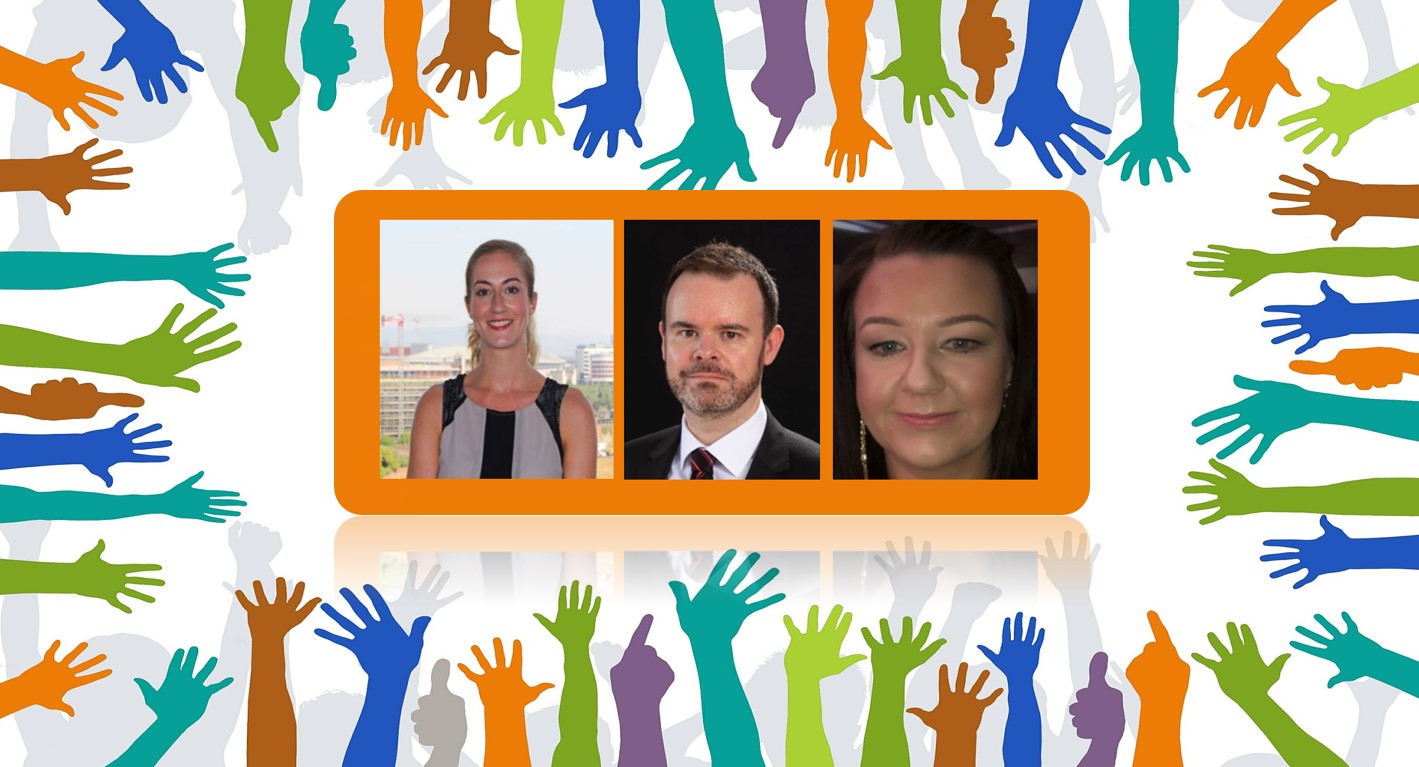MAXIMISING STUDENT POTENTIAL – CELEBRATING QUEEN’S MENTORING VOLUNTEERS 
03 June 2021
During Volunteers’ Week 2021 (1- 7 June), we continue to examine the role graduates play in the life of Queen’s by thanking and acknowledging those who serve as mentors – passing on career experiences to current students.
Across a broad range of volunteering areas, this week we are focusing on some of the many hundreds of graduates who, during the last 12 months, have given the gift of time in support of the University. You can find out more about volunteering as an alumni here.
Today, we acknowledge those graduates who serve as mentors, inspiring students and staff to dream and to see in themselves aspects of their potential that may otherwise remain hidden.
Why is mentoring important? “Mentoring is a great way to reassure, encourage and support students,” said BA Criminology (2010) graduate Aisling Laverty (above left), who is PwC Team Lead - AdValue Consulting. “As a previous Queen’s student I know how important it is to seek and receive advice in relation to career paths and options.
“I shared my previous experiences with my mentee; I talked about my career path to date and my ups and downs and I encouraged her that challenge is good."
As Natasha Sharma, the University’s Alumni Relations Volunteer Manager says: "Mentoring is about helping individuals to understand the skills they have, as well as those they might need to develop in their careers. The aim is to provide our students and staff with a supported framework to think about the career options that are open to them.”
And this year we saw the introduction of alumni involved in more mentoring schemes than ever before! Alumni were invited to mentor female staff members on the Aurora Development Programme for women, under the Queen’s Gender Initiative. Another example is the fantastic input from Queen’s Economics Alumni, who mentored 15 current economic students this year to guide them in their path.
The number one reason for seeking a mentor is career progression, to learn from someone – who may or may not have chosen a similar profession – and to benefit from their experiences. It is also a wonderfully mutual way for mentors (graduates) and mentees (students and staff) to build on their interpersonal skills and develop their networks.
“By acting as a sounding board and signposting students to think outside the box – and often just by instilling in them the confidence needed to progress up the career ladder – a mentor can enable their student mentee to be ‘work ready’ when they graduate,” added Natasha.
A prime example of volunteer mentoring is the Queen's Faculty of Arts, Humanities and Social Sciences (AHSS) Student-Alumni mentoring programme. Over 50 graduate mentors from across the five schools in the Faculty currently provide guidance and support in a mentoring programme.
Launched in January 2020, the pilot programme was an overwhelming success, with feedback recognising the amazing opportunity afforded by mentoring, with one student saying: ‘it will open your eyes to so many possibilities that you wouldn't have thought of,’
BSc Business Management (2005) graduate Laurie Montgomery (above right), who is now Business Process Consultant at Danske Bank, said: “Mentoring is a great way to share knowledge and experience, to support others and develop confidence in individuals to help them grow, develop and progress."
And would she consider mentoring again? “I think the programme is a great way of supporting others at a critical time in their career paths. I will definitely be volunteering to do it again!”
Among AHSS mentors are graduates who are enjoying successful careers in publishing, public relations, advertising, the law, journalism and management consultancy.
“The Mentoring Scheme is a great opportunity for alumni to help and support students in the progression from study to starting a career,” said LLB (2003) graduate and first time mentor, Joseph O'Keeffe (pictured centre).
“Mentoring was a good experience,” he added. “It was great to give something back to the University and to help those who are now in the same position that I was once in, preparing to choose the right career path.”
Volunteering in this way gives graduates an opportunity to play an active part not just in the life of the University but in the future careers of the next generation.
“Mentoring offers a chance to give something back to the University and to make a lasting impression on someone who will undoubtedly cherish the experience, long after the mentoring relationship has expired," said Natasha Sharma. "In most cases too, the simple act of volunteering will also have a really positive impact on the individual’s mental health and wellbeing.
“And the more often you volunteer as a mentor, the greater the rewards!” she added.
For further information on volunteering or mentoring, please contact Alumni Relations Volunteering Manager, Natasha Sharma.
For general enquiries about this story or to submit a graduate news item, please contact Gerry Power, Communications Officer, Development and Alumni Relations Office, Queen’s University Belfast.
Back to Main News
Top of Page